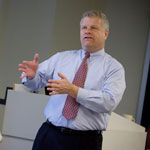Farewell tribute to Roger Ruggles
 Professor Roger W. Ruggles, Lafayette is grateful for your commitment to bringing your expertise to the classroom.
Professor Roger W. Ruggles, Lafayette is grateful for your commitment to bringing your expertise to the classroom.
You joined the Department of Civil Engineering as an instructor in 1985. You received your Ph.D. from Clarkson University in 1986 and were appointed to assistant professor. In 1991, you were tenured and promoted to the rank of associate professor.
Throughout your career at Lafayette, you taught a broad range of courses within the civil engineering program and the engineering division. Many students appreciated the hands-on approach that your courses provided.
Over the years, both the equipment and software used in your courses have undergone significant changes. Back in the day, you were the surveying guy! A 1992 graduate recalled the first Total Station, calling it the “technology of the year,” commenting on using the built-in data collection and digital display, and remembering how he and others took turns using it instead of theodolites with Vernier scales and Philadelphia rods. You were also an early adopter of GIS software and technology and involved many students in GIS projects that benefited local municipalities. Today your students are using GPS, LIDAR, and AutoCAD Civil 3D.
As a licensed professional engineer and nationally recognized expert witness for flooding litigation, you have authored over 50 engineering reports and conducted over 100 studies, which provided you with real-life experiences that you brought to the classroom. Colleagues often heard you sharing stories of various stormwater and flooding situations across much of the Northeast. Based on your many years of consulting work, the stories you shared helped students understand the importance of stormwater management and the damage storms can cause.
Roger, you have research connections that extended to Africa. One of your most exciting projects was one where you led teams of students and faculty to Uganda to conduct NSF-funded research on wetlands for several summers in the early 2000s. It was a very memorable time for everyone involved, both for the amazing sightings of wildlife, including swarms of bats over Kampala, and the wonderful people who hosted Lafayette students and faculty and took part in the research. You certainly deserved a great deal of credit for leading this effort and managing all of the logistics involved in international travel.
Roger, you have been active in your department, at the College, and in the Easton community. You served as department head on several occasions, leading efforts to restructure the curriculum and address major changes required by ABET in the late 1990s. At that time, you conducted a survey of hundreds of Lafayette’s civil engineering alumni to gather information on the skills and attributes they found most important to their work as engineers. The results of that survey helped the department move forward with a new vision for the curriculum at the start of the 21st century.
You have served on faculty elected committees, including the Faculty Academic Policy Committee, Faculty Committee on Diversity (which you chaired), Teaching and Learning Committee, and Board of Trustees Committee on Grounds and Buildings. Furthermore, you have served as a member of appointed committees and on several search committees.
Roger, you have been a faculty mentor to the football team and a board member of the Maroon Club. Perhaps your most significant service has been to the Easton community, particularly in the area of local government, in which you serve as a member of the Easton City Council and chair its Public Works Committee.
Roger, you are remembered by many students as the professor who contributed greatly to their success. As one student writes, “I had a tough time managing my studies and playing basketball. I had numerous meetings and discussions with Dr. Ruggles throughout my four years at Lafayette. I really don’t think I would have graduated as an engineer without his help along the way.” Another student recalled how unmotivated he was in civil engineering: “I was struggling with an immature attitude and little desire to truly learn the subject … until Roger Ruggles arrived.”
Your colleagues will always remember you for your infectious laugh, your bright smile, your willingness to lend a hand, and for always passing along a caring hello.